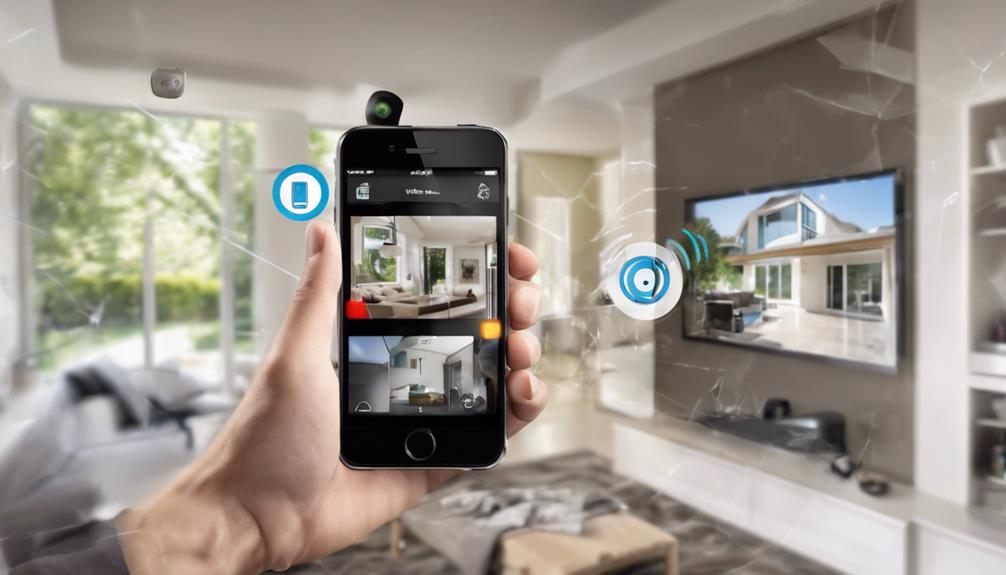Wireless home security systems grant you quick installation and flexibility without drilling, perfect for DIY enthusiasts. They seamlessly integrate with smart home devices and offer battery backups. However, cybersecurity risks and maintenance for battery-powered sensors can be a concern. In comparison, wired systems have lower hacking risks and are ideal for large spaces, although they can be challenging to install and lack remote access capabilities. It's essential to carefully consider these aspects to choose the best system for your needs.
Key Takeaways
- Quick and easy DIY installation.
- Seamless smart home integration.
- Vulnerability to cyberattacks.
- Regular maintenance for sensor batteries.
- Limited range in larger properties.
Benefits of Wireless Systems

When considering home security options, wireless systems present numerous advantages that cater to modern homeowners' needs.
Wireless system benefits include quick and easy installation, with no drilling or complex wiring necessary. This makes installing wireless systems a breeze, saving you time and effort.
Additionally, the flexibility of wireless security systems allows for easy sensor placement, adapting to your changing security requirements. With battery backups ensuring continuous monitoring during power outages, you can rest assured that your home is always protected, even in emergencies.
Furthermore, wireless systems seamlessly integrate with smart home devices, offering advanced features like remote access and automation capabilities.
The ability to upgrade or modify wireless security systems easily enables you to add new components as needed, ensuring your security system evolves with you.
Embracing the benefits of wireless home security systems empowers you to safeguard your home efficiently and effectively.
Drawbacks of Wireless Systems
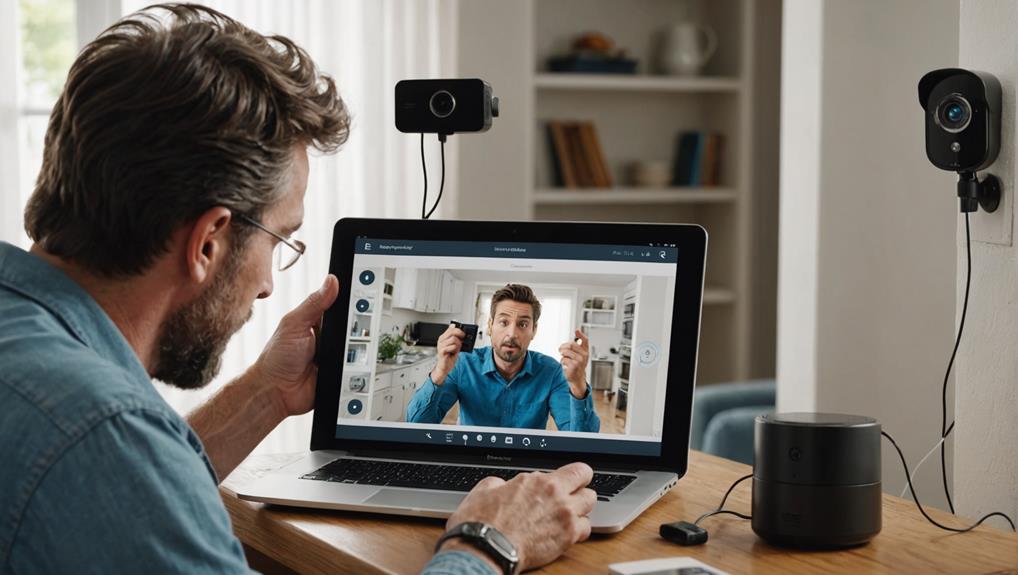
Despite the convenience and flexibility that wireless home security systems offer, there are several drawbacks to keep in mind. One of the main concerns with wireless security systems is their vulnerability to hacking and cyberattacks, especially if proper Wi-Fi security measures like strong passwords and encryption protocols aren't in place.
Additionally, these systems can be prone to environmental factors that affect their performance, such as signal interference from household devices like microwaves, leading to communication disruptions. It's also important to note that wireless systems, when compared to wired security systems, often face more significant issues with reliability and stability.
Another issue to examine is the need for regular battery maintenance for wireless sensors. Failure to replace batteries on time can result in power loss and system malfunctions.
Furthermore, wireless security systems may have limited operational range, making them less effective in larger properties or those with thick walls that obstruct signals.
Comparison With Wired Systems

When considering the differences between wired and wireless home security systems, it's important to weigh the features, installation process, and flexibility each system offers.
Wired systems boast a stable connection unaffected by household interference, while wireless systems provide easier installation and relocation options.
According to a comparative analysis of these systems, wired setups typically offer more robust protection against hacking.
Understanding these distinctions can help you choose the system that best fits your security needs and preferences.
Wired vs. Wireless Features
For those considering home security systems, understanding the differences between wired and wireless features is essential for making an informed decision.
Wired systems offer a stable connection through physical cables, ensuring reliability without interference. In contrast, wireless systems rely on signals that can be disrupted by household devices or environmental factors.
Wireless options provide easier installation and portability, allowing for DIY setup, while wired systems often require professional installation due to their complexity.
When it comes to coverage, wired systems support larger areas with more sensors, free from distance limitations from the control panel.
On the other hand, wireless systems may have a limited operational range, making them better suited for smaller properties.
Wireless systems excel in advanced features like smart home integration and remote access via mobile devices, providing convenience that wired systems may lack.
While wired systems generally have lower long-term costs due to no cloud storage fees, wireless systems may incur ongoing expenses from cloud storage subscriptions.
Installation and Flexibility
Setting up a wireless home security system is a breeze compared to its wired counterpart. With wireless systems, you can easily install them yourself without the need for professional assistance, unlike wired systems that require drilling and professional installation due to cabling.
The flexibility of wireless systems shines through in sensor placement, allowing you to adjust to changing security needs effortlessly. If you want to expand your security setup, adding new components like sensors or smart home devices is a seamless process with wireless systems, eliminating the complex wiring modifications that wired systems demand.
Furthermore, the ease of relocation sets wireless systems apart, offering adaptability for homeowners who may move or wish to reconfigure their security setup. Say goodbye to intrusive installations with wireless systems, as you won't have to deal with running wires through walls or making permanent property modifications like you'd with wired systems.
Wi-Fi Dependency and Cybersecurity

A significant challenge faced by wireless home security systems is their reliance on Wi-Fi for connectivity, which can introduce vulnerabilities regarding cybersecurity. Since many wireless systems depend on Wi-Fi, they may encounter operational issues if the internet connection is lost or unstable.
Additionally, integrating IoT devices with home security systems can further complicate cybersecurity due to the increased number of entry points for potential attacks. Furthermore, wireless systems are more susceptible to hacking compared to wired systems, as they can be intercepted remotely.
To address these risks, it's essential to implement strong passwords for accounts and use antivirus software on connected devices. Regular software updates and secure Wi-Fi encryption protocols are also vital to enhance cybersecurity.
Despite these vulnerabilities, studies suggest that burglars still prefer traditional break-ins over targeting wireless systems, as they often employ physical methods that bypass digital security measures.
Maintenance and Best Practices
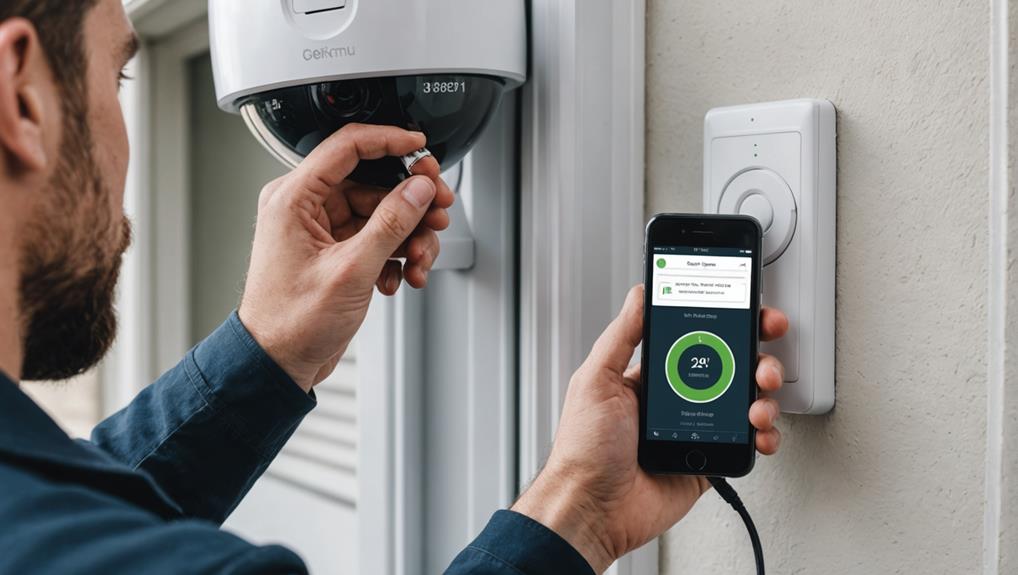
To guarantee the security of your wireless home security system, remember to regularly update passwords and install antivirus software on your connected devices.
Strong encryption protocols for your Wi-Fi network are essential in protecting against unauthorized access and potential hacking.
Wireless systems are generally easier to install compared to their wired counterparts, but they do require more frequent maintenance to remain effective.
Conduct routine system checks for software updates and functionality to maintain the ideal performance of your wireless devices.
For more information on the differences between these systems, you can refer to choosing the right alarm system.
Password Security Measures
Regularly updating your passwords for your wireless security system is essential for maintaining a high level of security. By frequently changing your passwords, you greatly reduce the risk of unauthorized access and enhance the overall safety of your home.
Remember to create strong passwords that include a mix of letters, numbers, and special characters to protect against potential hacking attempts. Additionally, enabling two-factor authentication (2FA) on your security system accounts adds an extra layer of security, making it more challenging for intruders to gain access.
Don't forget about changing default passwords on all devices connected to your security system, as these are often easily accessible online. Keeping a record of password changes and using a secure method for password management can help prevent any loss of access to your security system.
Prioritizing password security measures is key to ensuring the safety of your home and loved ones.
System Maintenance Tips
Wondering how to keep your wireless home security system running smoothly? Start by regularly updating your Wi-Fi network passwords and using strong encryption to boost security.
Schedule periodic system checks to confirm all components work well and software updates are up to date. Replace batteries in wireless sensors as needed, opting for systems with battery life indicators to prevent sudden outages.
Educate household members on best practices, like identifying false alarms and mastering system controls. When choosing a system, go for ones with dual communication methods (Wi-Fi and cellular) for better reliability during network disruptions.
Pros of Wired Systems
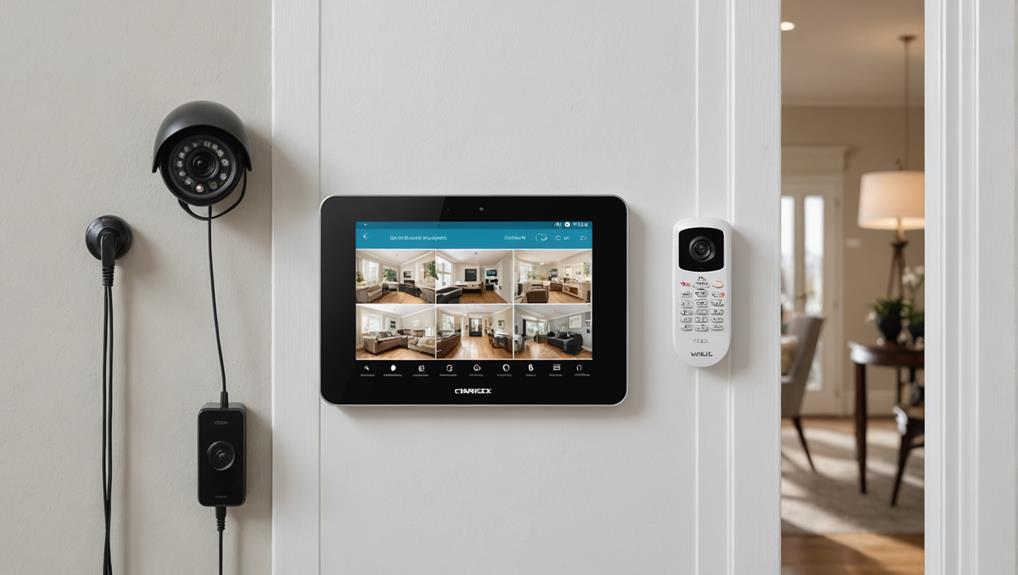
When considering home security systems, opting for a wired setup presents several advantages worth noting.
Wired systems offer a lower hacking risk since they require a physical connection, making unauthorized access more difficult. They're ideal for large spaces, spanning multiple buildings without signal loss. Additionally, wired systems can accommodate more sensors than wireless systems, ensuring extensive coverage.
These systems often feature advanced capabilities like multi-room control panels and high-definition video surveillance. With minimal interference, wired systems deliver reliable performance, ensuring consistent security monitoring.
Wired systems are known for their reliability, security, and long-term use, making them a dependable choice for homeowners. If you prioritize security and reliability in your home protection, a wired system may be the best choice for your needs.
Consider the benefits of wired systems when making your decision on the most suitable home security setup.
Cons of Wired Systems

Considering the benefits of wired home security systems is important, but it's equally crucial to acknowledge the drawbacks associated with this type of setup. Here are some cons of wired systems that you should be aware of:
1. Complex Installation: Wired systems require professional installation, which can be time-consuming and costly due to the intricate wiring process.
This complexity can also introduce challenges in security system installations, such as ensuring all components are correctly connected and operational.
2. Limited Flexibility: Once installed, wired systems are challenging to move or remove, making it inconvenient if you plan to relocate or upgrade your security system.
3. Lack of Remote Access: Unlike wireless systems, wired setups typically lack remote control capabilities, restricting your ability to monitor or manage your security system from a distance.
These limitations might impact your decision when choosing a home security system, so it's crucial to weigh the pros and cons carefully before making a choice.
Pros of Wireless Systems
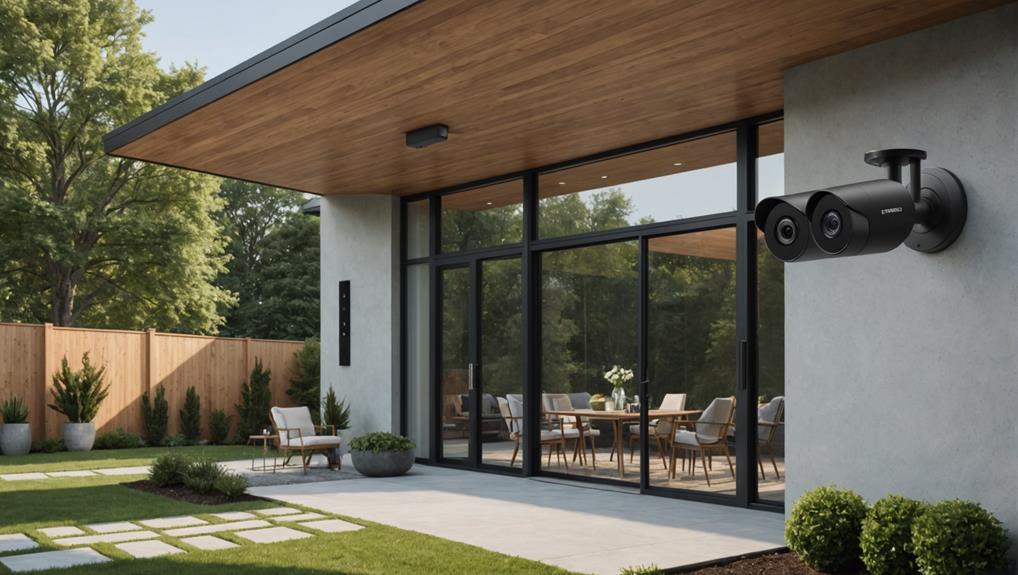
If you're looking for a home security system that offers easy installation and enhanced flexibility, wireless systems might be the perfect choice for you. With wireless systems, setting up your security system becomes a breeze as there's no need for drilling or dealing with complex cables. This simplicity makes them ideal for those who prefer a DIY approach.
Additionally, the absence of visible wires reduces the risk of tampering by intruders, providing enhanced security for your home.
In addition, wireless security systems offer greater flexibility in sensor placement, allowing you to customize the system to suit your property layout and specific needs. Many wireless systems also come equipped with battery backups, ensuring continuous monitoring even during power outages.
Additionally, integrating smart home technology with traditional home alarms can greatly enhance both security and convenience. Moreover, the ability to integrate smart home automation features adds convenience and functionality, giving you control over your security system and other connected devices.
Wireless systems truly offer a seamless and adaptable home security solution for your peace of mind.
Cons of Wireless Systems
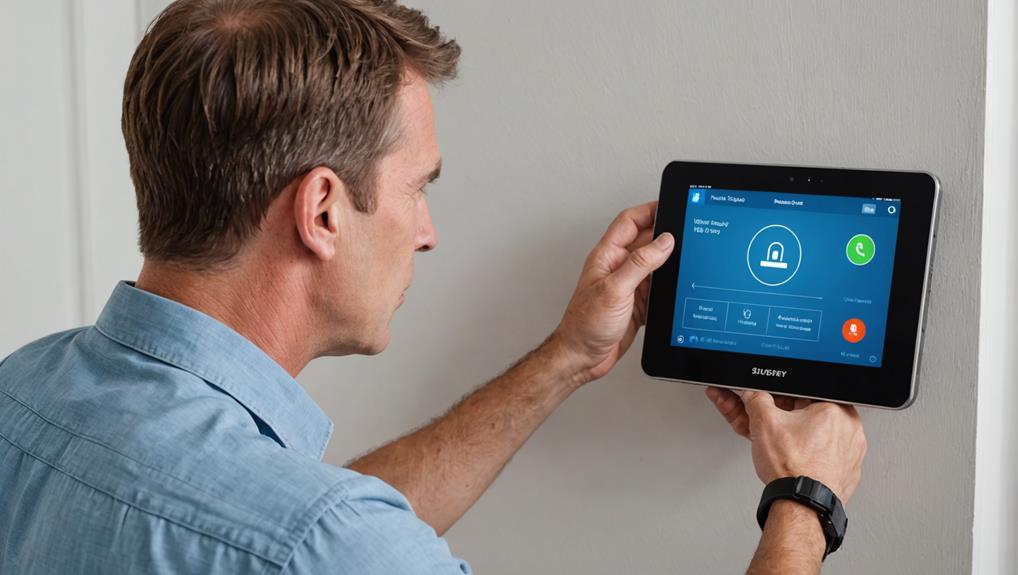
Although wireless home security systems offer convenience and flexibility, they also come with their share of drawbacks. Here are some cons to take into account:
1. Vulnerability to hacking and signal jamming: Wireless systems are more susceptible to breaches, requiring robust security measures to prevent unauthorized access.
Integration of IoT devices can sometimes exacerbate this issue if not properly secured.
2. Regular maintenance for battery-powered sensors: The need for frequent battery replacements and upkeep adds an ongoing task for homeowners, potentially causing inconvenience.
3. Connectivity issues and interference: Household devices can disrupt the signals of wireless systems, leading to delays or failures in alarm activation and monitoring.
This interference can be particularly problematic in homes with a high number of connected devices.
These drawbacks highlight the significance of weighing the pros and cons when choosing a home security system.
While wireless systems offer certain advantages, it's vital to address these potential issues to guarantee the security of your home and loved ones.
Frequently Asked Questions
What Are the Disadvantages of Wireless Security?
When it comes to wireless security systems, some downsides to contemplate include vulnerability to hacking due to inadequate Wi-Fi security, the risk of sensor failures if batteries aren't replaced regularly, potential signal disruptions from thick walls or household devices, limited coverage range for larger properties, and the need for ongoing cloud storage subscriptions adding to long-term costs.
These factors might make you think twice before opting for a wireless setup.
Is It Better to Have a Wired or Wireless Security System?
For your home security system, you may find that deciding between wired and wireless options can be a tough choice.
Wired systems offer reliability but require more installation work. On the other hand, wireless systems are simpler to set up and allow for flexibility, but they can be vulnerable to hacking.
Consider your needs and weigh the trade-offs to determine the best fit for your peace of mind.
What Is the Downside to Wi-Fi Security Cameras?
The downside to Wi-Fi security cameras lies in their susceptibility to hacking and connectivity issues. Strong passwords and encryption are essential for protection, while internet dependency can lead to recording lapses during outages.
Signal interference from household devices may cause missed alerts, and battery-operated cameras require regular maintenance. Additionally, reliance on cloud storage can incur extra fees and pose data loss risks.
Prioritize security measures and system upkeep to mitigate these drawbacks.
How Secure Are Wireless Alarm Systems?
Wireless alarm systems offer convenience but may raise concerns about security. Proper measures like strong passwords and encryption help safeguard them.
While burglars may prefer traditional break-ins, cybersecurity remains important. Regular updates and antivirus software enhance protection.
Internet outages may affect wireless systems, but cellular signals provide reliability. Cyberattacks are rare when security protocols are followed.
Conclusion
Overall, when considering the pros and cons of wireless home security systems, it ultimately comes down to personal preference and individual needs. While wireless systems offer convenience and flexibility, they may be more susceptible to Wi-Fi connectivity issues and cybersecurity threats. On the other hand, wired systems provide a reliable and secure option, but may require more installation and maintenance. Ultimately, it's important to weigh the advantages and disadvantages to determine the best fit for your home security needs.

